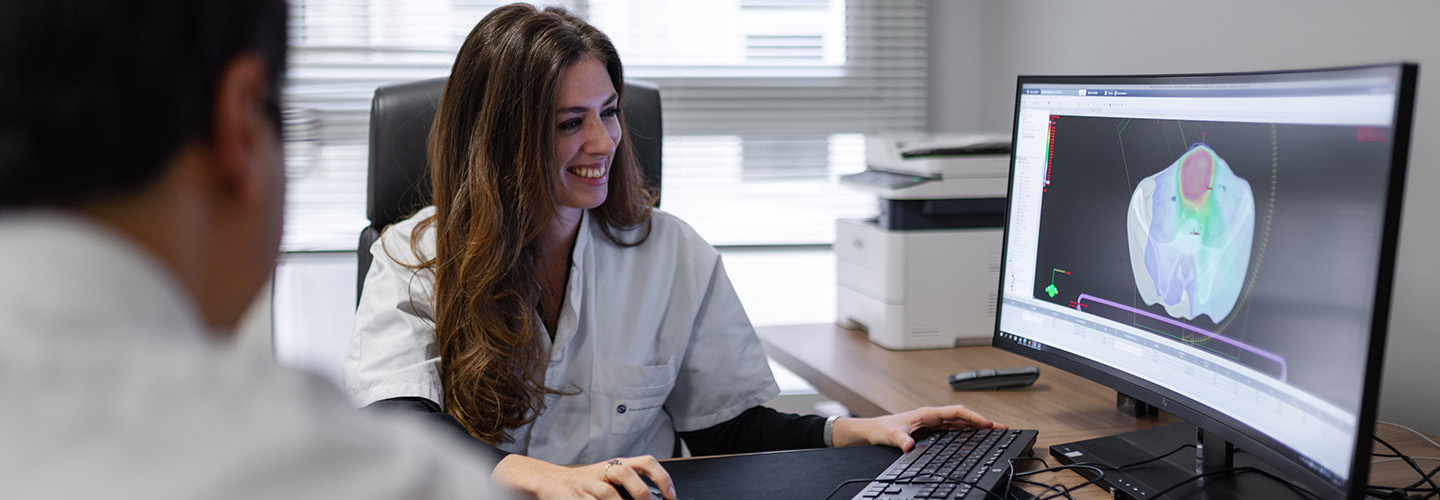


Pathologies
We treat most cancers at the Centre Azuréen de Cancérologie












Breast cancer diagnosis
The majority of breast cancers are detected at an early stage thanks to mammography screening. Sometimes they are diagnosed by self-palpation of a nodule or by symptoms related to the tumour. The diagnosis is confirmed with a biopsy to analyse the suspect nodule.
Breast cancer treatment
Depending on the type of breast cancer and the stage of the disease, different treatments may be offered alone or in combination. They will usually include surgery, chemotherapy and radiotherapy. Your oncologist will offer you the most suitable treatment based on scientific data, after discussion in a multidisciplinary meeting involving doctors from other specialisations. You may be offered inclusion in a therapeutic trial if you are eligible.
Lung cancer diagnosis:
Lung cancers are usually diagnosed with nonspecific symptoms: cough, pain, coughing up blood. The diagnosis is suggested based on evocative imaging on a CT scan or chest x-ray and confirmed by an endobronchial (fibroscopy) or transthoracic biopsy.
Lung cancer treatment
Depending on the type of lung cancer and the stage of the disease, different treatments may be offered alone or in combination. They will usually include surgery, chemotherapy, radiotherapy and immunotherapy.
Your oncologist will offer you the most suitable treatment based on scientific data, after discussion in a multidisciplinary meeting involving doctors from other specialisations.
You may be offered inclusion in a therapeutic trial if you are eligible.
Prostate cancer diagnosis
Prostate cancers are usually diagnosed through individual screening based on annual PSA testing and a digital rectal examination. The diagnosis is confirmed thanks to prostate biopsies performed by a urologist.
Prostate cancer treatment
Prostate cancer is treated depending on the stage, with different treatments alone or in combination: surgery, radiotherapy, hormone therapy and in some cases chemotherapy.
Your oncologist will offer you the most suitable treatment based on scientific data, after discussion in a multidisciplinary meeting involving doctors from other specialisations.
You may be offered inclusion in a therapeutic trial if you are eligible.
Colon and rectal cancer diagnosis
Cancers of the rectum are usually diagnosed through nationally organised screening every 2 years which involves looking for blood in stools. The diagnosis is confirmed by a colonoscopy and a biopsy
Colon and rectal cancer treatments
Colon and rectal cancers are treated depending on the stage, with different treatments alone or in combination: surgery, radiotherapy and chemotherapy.
Your oncologist will offer you the most suitable treatment based on scientific data, after discussion in a multidisciplinary meeting involving doctors from other specialisations.
You may be offered inclusion in a therapeutic trial if you are eligible.
Urinary tract cancer diagnosis
Cancers of the urinary tract are usually diagnosed when people notice blood in their urine, followed by a cystoscopy.
Urinary tract cancer treatments
Different treatments can be offered alone or in combination. They usually involve surgery, chemotherapy, radiotherapy and immunotherapy.
Your oncologist will offer you the most suitable treatment based on scientific data, after discussion in a multidisciplinary meeting involving doctors from other specialisations.
You may be offered inclusion in a therapeutic trial if you are eligible.
Gynaecological cancer diagnosis
Gynaecological cancers are usually diagnosed after the appearance of clinical signs such as vaginal bleeding or when performing screening tests such as a cervical smear or an endometrial ultrasound.
Gynaecological cancer treatments
Different treatments can be offered alone or in combination. They usually involve surgery, chemotherapy, radiotherapy and immunotherapy.
Your oncologist will offer you the most suitable treatment based on scientific data, after discussion in a multidisciplinary meeting involving doctors from other specialisations.
You may be offered inclusion in a therapeutic trial if you are eligible.
Skin cancer diagnosis
Skin cancers are usually diagnosed by dermatologists who carry out the resection or biopsy of a pathological skin lesion.
Skin cancer treatments
Different treatments can be offered alone or in combination. They usually involve surgery, chemotherapy, radiotherapy and immunotherapy.
Your oncologist will offer you the most suitable treatment based on scientific data, after discussion in a multidisciplinary meeting involving doctors from other specialisations.
You may be offered inclusion in a therapeutic trial if you are eligible.
Upper gastrointestinal cancer diagnosis
Upper gastrointestinal cancers such as stomach and esophageal cancer are diagnosed following suggestive symptoms or during a screening endoscopy. A biopsy of a suspicious lesion will confirm the diagnosis.
Upper gastrointestinal cancer treatment
Different treatments can be offered alone or in combination. They usually involve surgery, chemotherapy, radiotherapy and immunotherapy.
Your oncologist will offer you the most suitable treatment based on scientific data, after discussion in a multidisciplinary meeting involving doctors from other specialisations.
You may be offered inclusion in a therapeutic trial if you are eligible.
Diagnosis of cancer of the upper aero-digestive tract
Cancers of the upper aero-digestive tract are diagnosed following symptoms related to the ENT sphere with the performance of an endoscopy to confirm the diagnosis
Treatment of cancer of the upper aero-digestive tract
Different treatments can be offered alone or in combination. They usually involve surgery, chemotherapy, radiotherapy and immunotherapy.
Your oncologist will offer you the most suitable treatment based on scientific data, after discussion in a multidisciplinary meeting involving doctors from other specialisations.
You may be offered inclusion in a therapeutic trial if you are eligible.
Brain cancer diagnosis
Brain cancers are diagnosed after symptoms which lead doctors to carry out brain imaging.
Brain cancer treatments
Different treatments can be offered alone or in combination. They usually involve surgery, chemotherapy, radiotherapy and immunotherapy.
Your oncologist will offer you the most suitable treatment based on scientific data, after discussion in a multidisciplinary meeting involving doctors from other specialisations.
You may be offered inclusion in a therapeutic trial if you are eligible.
Diagnosis of cancer in elderly people
The incidence of cancer increases with age and the management of these cancers raises specific issues. Indeed, the tolerance and delivery of treatments usually given to younger people are not the same.
Treatment of cancer in elderly people
At the Centre Azuréen de Cancérologie, in partnership with Nice University Hospital, we offer an Onco-Geriatric consultation on site in Mougins. This specialised assessment makes it possible to determine the characteristics of the patient in order to adapt the treatments offered and to determine the best medical and social care.

